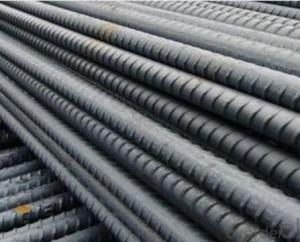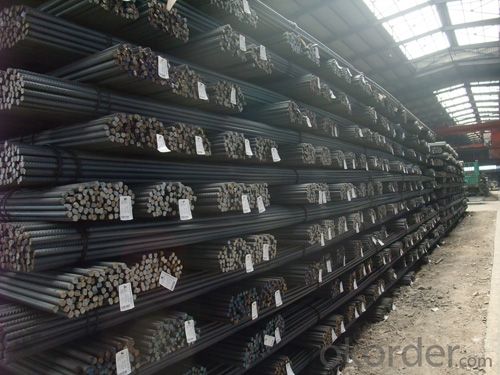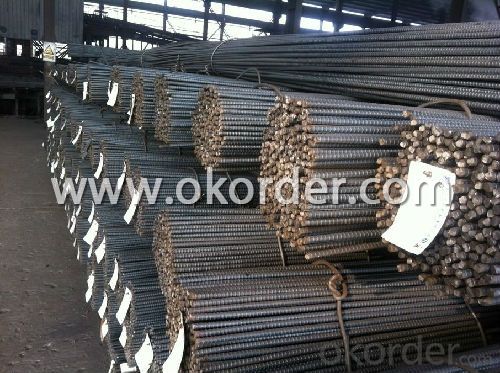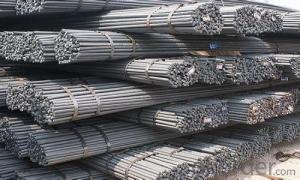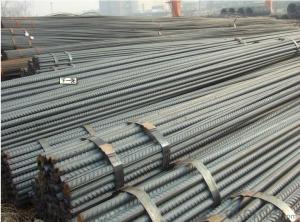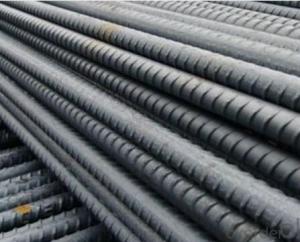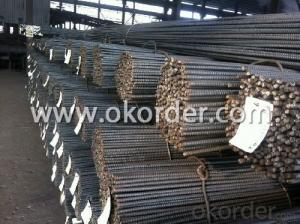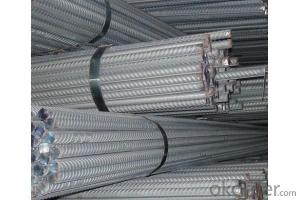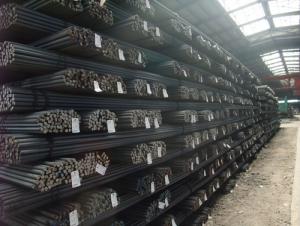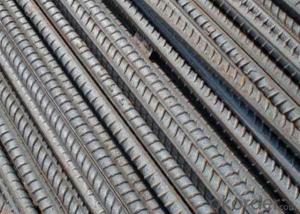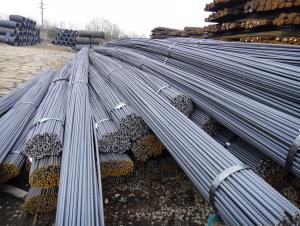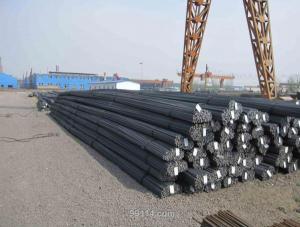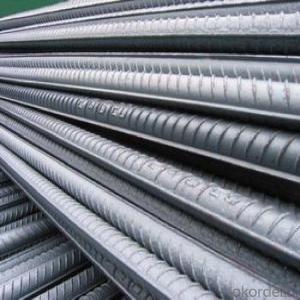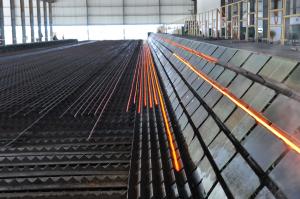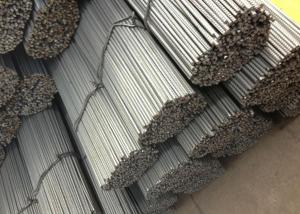HIGH QUALITY DIN HOT ROLLED STEEL REINFORCEMENT BAR
- Loading Port:
- Tianjin
- Payment Terms:
- TT OR LC
- Min Order Qty:
- 50 m.t.
- Supply Capability:
- 100000 m.t./month
OKorder Service Pledge
OKorder Financial Service
You Might Also Like
Product Description:
Specifications of Hot Rolled Steel Rebar:
The production process of Steel Rebar
1-Waling beam furnace 2-Roughing rolling group 3-Intermediate rolling train
4-Finishing rolling group 5-Water-cooling device 6-Walking beam cooler
7-Finishing equipment(including the cold scale shear,short feet collection system,
automatic counting device,bundling machine, collect bench)
Usage and Applications of Hot Rolled Steel Rebar:
Deformed bar is widely used in buildings, bridges, roads and other engineering construction. Big to highways, railways, bridges, culverts, tunnels, public facilities such as flood control, dam, small to housing construction, beam, column, wall and the foundation of the plate, deformed bar is an integral structure material. With the development of world economy and the vigorous development of infrastructure construction, real estate, the demand for deformed bar will be larger and larger..
Packaging & Delivery of Hot Rolled Steel Rebar:
Packaging Detail: products are packed in bundle and then shipped by container or bulk vessel, deformed bar is usually naked strapping delivery, when storing, please pay attention to moisture proof. The performance of rust will produce adverse effect.
Each bundle weight: 2-3MT, or as required
Payment terms: TT payment in advance or Irrevocable LC at sight.
Trade terms :FOB, CFR, CIF
Label:to be specified by customer, generally, each bundle has 1-2 labels
Note:
1. Our products are produced according to national standard (GB), if not, supply according to national standards (GB) or agreement as customer required.
2. Other Grade and Standard Deformed Steel Bar we can supply:
Grade: GR40/GR60, G460B/B500A/B500B/B500C,BST500S
Standard: ASTM, BS, DIN
The Minimum Order Quantity of these products is high, and need to be confirmed.
3. We can not only supply Deformed Steel Bar; if you need anything about building materials, please contact us for further information.
4. Please send us your detail specifications when inquire. We will reply to you as soon as possible. We sincerely hope we can establish a long stable business relationship.
- Q: How are steel rebars protected from damage during handling and transportation?
- Steel rebars are typically protected from damage during handling and transportation through various methods such as bundling, strapping, and using protective caps or covers. Additionally, they are often stored and transported in specialized containers or pallets to prevent any potential bending, scratching, or other forms of physical damage.
- Q: How do steel rebars reinforce concrete?
- The structural stability of concrete is reinforced by steel rebars, which provide additional strength. Concrete possesses strength under compression but is weak when subjected to tension. To counteract this weakness and enhance its tensile strength, steel rebars are embedded in the concrete. The rebars function as reinforcement by absorbing the tensile forces that arise when a structure undergoes bending or stretching. In the presence of such forces, the rebars evenly distribute the load across the concrete, preventing cracks and failure. This is particularly crucial in buildings, bridges, and dams, where the concrete must withstand diverse external forces. Furthermore, the rebars help regulate the expansion and contraction of the concrete resulting from temperature changes. Since steel and concrete have similar coefficients of thermal expansion, steel rebars assist in minimizing stress caused by temperature fluctuations, thus reducing the likelihood of cracking. Additionally, the bond between the steel rebars and the concrete is vital for effective reinforcement. The rough surface of the rebars ensures excellent adherence to the surrounding concrete, enabling them to function as a composite material. This bond facilitates the transfer of stress from the concrete to the rebars, thereby enhancing the overall strength and durability of the structure. To summarize, steel rebars reinforce concrete by providing tensile strength, distributing loads, controlling temperature-induced stress, and establishing a robust bond with the concrete. The combination of concrete and steel results in a reinforced concrete structure capable of withstanding various external forces and maintaining its structural integrity over time.
- Q: What is the recommended diameter of steel rebars for foundation reinforcement?
- The recommended diameter of steel rebars for foundation reinforcement typically ranges from 10mm to 32mm, depending on the size and load-bearing requirements of the specific foundation project.
- Q: What is the role of steel rebars in column and beam construction?
- Steel rebars play a crucial role in column and beam construction as they provide reinforcement and strength to the structure. They are used to enhance the load-bearing capacity, resist tensile forces, and prevent cracking or failure due to external pressures. By reinforcing the concrete, rebars ensure stability, durability, and structural integrity, making them essential components in the construction of columns and beams.
- Q: Can steel rebars be galvanized for additional protection?
- Yes, steel rebars can be galvanized for additional protection. Galvanizing is a process where a layer of zinc is applied to the surface of the steel rebar. This layer acts as a protective barrier, preventing corrosion and extending the lifespan of the rebar. Galvanized steel rebars are commonly used in construction projects where exposure to moisture, chemicals, or other corrosive elements is expected. The galvanizing process involves dipping the steel rebars into a bath of molten zinc or applying a zinc-rich coating through a hot-dip galvanizing or electroplating process. This results in a durable and corrosion-resistant coating that provides additional protection to the steel rebar, increasing its longevity and reducing maintenance requirements. Overall, galvanizing steel rebars is an effective method of enhancing their protection against corrosion and ensuring their long-term durability in various applications.
- Q: How are steel rebars measured and priced?
- Steel rebars are typically measured and priced based on their length, thickness, and weight. The length is measured in feet or meters, and the thickness is measured in inches or millimeters. The weight is usually given in pounds or kilograms. The pricing of steel rebars depends on current market conditions, including factors such as supply and demand, raw material costs, and manufacturing expenses. Additionally, any additional processing or customization requested by the customer may also impact the final price.
- Q: What is the standard length of steel rebars?
- The length of steel rebars commonly differs according to the region and project specifications. In the United States, for instance, the standard length is typically 20 feet or 6.1 meters. Nevertheless, it is crucial to acknowledge that rebars can be tailored and adjusted to meet the required lengths for a specific construction project. Moreover, in certain countries or regions, rebars may come in various standard lengths as per local construction norms and regulations. Hence, it is imperative to refer to local codes and specifications for determining the appropriate standard length of steel rebars for a particular project.
- Q: What are the advantages of using ribbed steel rebars?
- Using ribbed steel rebars in construction projects offers several advantages. To begin with, the ribbed design of these rebars enhances the bonding with concrete. The presence of ribs increases the contact surface area between the rebar and the surrounding concrete, resulting in improved adhesion and prevention of slippage. This ultimately leads to a stronger bond, ensuring the structural integrity of the reinforced concrete. Secondly, ribbed steel rebars provide enhanced resistance against shear forces. The ribs act as anchor points within the concrete, evenly distributing the load and reducing the risk of failure due to shear stress. This makes ribbed rebars particularly suitable for applications that experience high shear forces, such as beams and columns. Additionally, the ribbed pattern of these rebars improves their ductility. Ductility refers to a material's ability to undergo deformation without breaking. The presence of ribs allows the steel rebar to stretch and bend without fracturing, making it more resistant to cracking or failure under stress. This is particularly crucial in earthquake-prone areas, where a structure's ability to absorb and dissipate energy is vital for its survival. Furthermore, ribbed steel rebars demonstrate excellent corrosion resistance. The ribs act as a barrier, effectively preventing moisture and corrosive agents from reaching the steel core. This significantly prolongs the lifespan of the rebar, reducing maintenance costs and ensuring the long-term durability of the reinforced concrete structure. Lastly, ribbed steel rebars are readily available and cost-effective. They come in various sizes and lengths, allowing for easy customization to meet different construction needs. Additionally, due to their popularity and widespread use, ribbed rebars are competitively priced, making them a cost-effective option for reinforcing concrete structures. In conclusion, the use of ribbed steel rebars offers multiple benefits, including enhanced bonding with concrete, improved resistance to shear forces, greater ductility, excellent corrosion resistance, and cost-effectiveness. These advantages make ribbed rebars an ideal choice for reinforcing concrete structures, guaranteeing strength, durability, and longevity in construction projects.
- Q: How do steel rebars impact the overall construction cost estimation process?
- Steel rebars have a significant impact on the overall construction cost estimation process. These reinforcing bars are crucial components in reinforced concrete structures, providing strength and durability to the building. As such, their inclusion in cost estimation is essential for accurately assessing the total project cost. Firstly, steel rebars contribute to the material cost of the construction project. Since rebars are typically priced based on weight, the quantity and size of rebars required for the structure directly affect the material cost estimation. The accurate identification and quantification of rebars are necessary to ensure an appropriate budget allocation for the project. Moreover, steel rebars also influence the labor cost estimation. Installing rebars requires skilled labor, and the time and effort involved in cutting, bending, and placing the rebars must be considered. The complexity of the reinforcement design, such as intricate shapes or complex detailing, can increase labor costs. Therefore, accurate estimation of rebars allows for better planning of labor resources and cost allocation. In addition to material and labor costs, steel rebars impact other aspects of the construction cost estimation process. For instance, the weight and placement of rebars affect the structural design, which can influence the cost estimation of the concrete mix design and formwork requirements. The size and spacing of rebars may also impact the excavation and foundation costs, as well as the overall project timeline. Furthermore, steel rebars contribute to the long-term costs of the construction project. The quality and durability of rebars directly affect the lifespan and maintenance requirements of the structure. Investing in high-quality rebars can reduce future maintenance and repair costs, as well as enhance the overall life cycle cost analysis of the project. In conclusion, steel rebars have a significant impact on the overall construction cost estimation process. Accurate estimation of rebars is essential for determining the material and labor costs, as well as influencing other cost-related aspects of the project. It allows for precise budget allocation, resource planning, and consideration of long-term costs, ultimately leading to a more reliable and comprehensive construction cost estimation.
- Q: What are the guidelines for the proper anchoring of steel rebars in columns?
- To guarantee the structural integrity and safety of reinforced concrete structures, it is crucial to adhere to guidelines regarding the appropriate anchoring of steel rebars in columns. These guidelines are typically established based on industry standards and codes, such as the American Concrete Institute (ACI) Building Code Requirements for Structural Concrete (ACI 318). 1. Lap Length: For sufficient bond strength, rebars must overlap by a minimum distance known as the lap length. This length is determined considering factors like rebar diameter, grade, concrete strength, and design requirements. To calculate the required lap length, specific formulas and tables provided by ACI 318 are used. 2. Embedment Length: The embedment length refers to the section of the rebar embedded within the concrete column. Achieving adequate embedment is essential to effectively transfer applied loads. The embedment length is determined based on factors such as rebar diameter, grade, and compressive strength of concrete. 3. Development Length: The development length is the minimum length of rebar needed beyond the critical section to fully develop its tensile or compressive strength. This ensures the rebar can withstand applied loads and avoid premature failure. ACI 318 provides formulas to calculate the development length considering rebar diameter, grade, concrete strength, and design requirements. 4. Concrete Cover: Concrete cover refers to the thickness of concrete between the rebar's external surface and the column's outer surface. It provides protection against corrosion, fire, and environmental factors. The required concrete cover is determined by considering factors like rebar diameter, grade, exposure conditions, and design requirements. ACI 318 provides minimum cover requirements for different rebar sizes and exposure conditions. 5. Spacing and Positioning: Proper spacing and positioning of rebars within the column are crucial to ensure uniform load distribution and effective reinforcement. The spacing is determined based on column dimensions, rebar diameter, and design requirements. Additionally, rebars should be properly aligned and centered within the column to achieve the intended structural strength. 6. Mechanical Anchorage: In certain cases, mechanical anchorage devices like rebar couplers or headed bars are employed to enhance rebar anchoring in columns. These devices improve load transfer and prevent rebar slippage. The selection and installation of mechanical anchorage should adhere to the manufacturer's recommendations and relevant standards. 7. Quality Control and Inspection: Implementing proper quality control and inspection procedures during rebar installation in columns is crucial. This involves verifying dimensions, lap lengths, embedment lengths, development lengths, concrete cover, spacing, and positioning of the rebars. Regular inspections and non-destructive testing techniques such as ultrasonic or radiographic testing can be utilized to ensure compliance with guidelines and identify any defects or deviations. It is important to note that these guidelines may vary based on specific design requirements, local building codes, and structural considerations. Therefore, it is recommended to consult relevant standards and seek professional advice from structural engineers or experts to ensure proper anchoring of steel rebars in columns.
Send your message to us
HIGH QUALITY DIN HOT ROLLED STEEL REINFORCEMENT BAR
- Loading Port:
- Tianjin
- Payment Terms:
- TT OR LC
- Min Order Qty:
- 50 m.t.
- Supply Capability:
- 100000 m.t./month
OKorder Service Pledge
OKorder Financial Service
Similar products
Hot products
Hot Searches
Related keywords
